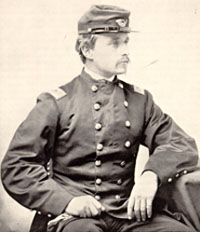Sarah LuriaAssociate Professor, Department of English |
Colonel Robert Gould Shaw, Biography
Source: Kirstein, Lincoln, Lay This Laurel (New York: Eakins Press, 1973). Colonel Robert Gould Shaw (10 Oct. 1837- 18 July 1863) Robert Gould Shaw was born in Boston, Massachusetts. His family belonged to Boston's upper class, or Brahmin society, and was related by marriage to the powerful Cabot and Russell families. Shaw's family was progressive; his mother was an abolitionist. Shaw did not share her views. He wrote his mother that "he did not 'see how one man could do much against slavery....I don't want to become a reformer, an apostle, or anything of that kind.'" At sixteen, having no other professions that attracted him, Shaw told his mother he planned to join the army. His parents instead first pushed him to go to Harvard, where Shaw was unhappy, misbehaved, and ranked in the lower third of his class. He left Harvard after only two years in 1858. He worked for two years in a counting house at a job which, according to one biographer, made him feel "enslaved." The Civil War then offered Shaw a much sought for opportunity. He enlisted as a private in 1861. He was wounded twice and survived the battle at Antietam, where 22,000 men suffered casualties. Shaw succeeded in his chosen profession and was promoted to the rank of Captain. In 1863 he married Annie Kneeland Haggerty, who belonged to a wealthy New York family. His mother disapproved of the marriage. Shaw disappointed his mother again when in 1863, after the passage of the Emancipation Proclamation, he was offered the chance to command the first "colored" volunteer regiment, the Massachusetts 54th. Shaw immediately turned down the offer, much to his mother's embarassment. She finally persuaded him to accept. Shaw was known as a severe disciplinarian. According to one officer, when training his troops, Shaw used "the method of coercion....The unruly members...were stood on barrels, bucked, gagged and, if need be, shot." Shortly after their deployment, Shaw suggested that the 54th should lead the assault on Fort Wagner, South Carolina. During the assault, 272 members of the regiment were killed, wounded, or captured. These losses helped prove the bravery and grit of African-American soldiers. Shaw's own death during the assault made him a hero, a "martyr to freedom." Source: Matthew H. Crocker, "Robert Gould Shaw," American National Biography (New York: Oxford, 1999).
|
